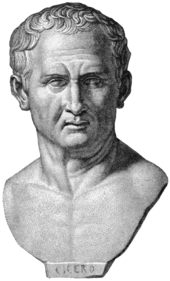Ipse dixit

Ipse dixit ("He, himself, said it"), also known as the bare assertion fallacy, is a term which is used to identify and describe a sort of arbitrary dogmatic statement which the speaker expects the listener to accept as valid.[1]
Ipse dixit denies that an issue is debatable. In other words, that's just the way it is.[2]
The fallacy of defending a proposition by baldly asserting it as a fait accompli ("That's just how it is"[3]) distorts the argument by opting out of it entirely: "The most basic way to distort an issue is to deny that it exists".[3]
History
The Latin form of the expression comes from the Roman orator and philosopher Cicero (106–43 BC) in his theological studies De Natura Deorum (On the Nature of the Gods) and is his translation of the Greek expression (with the identical meaning) «αὐτὸς ἔφα», an argument from authority made by the disciples of Pythagoras when appealing to the pronouncements of the master rather than to reason or evidence.[4][5]
Before the early 17th century, scholars applied the ipse dixit term to justify their subject-matter arguments if the arguments previously had been used by the Ancient Greek philosopher Aristotle (384–322 BC).[6]
Ipse-dixitism
In the late 18th century, Jeremy Bentham adapted the term ipse-dixit into the word ipse-dixitism.[7] Bentham coined the term to apply to all non-utilitarian political arguments.[8]
Legal usage
This term ipse dixit has been used in modern legal and administrative decisions, generally as a criticism of arguments based solely upon the authority of a given organization.
In 1997, the US Supreme Court recognized the problem of "opinion evidence which is connected to existing data only by the ipse dixit of an expert".[9]
See also
References
- ^ Whitney, William Dwight. (1906). "Ipse dixit," The Century dictionary and cyclopedia, pp. 379-380; Westbrook, Robert B. "John Dewey and American Democracy," p. 359.
- ^ Sebranek, Patrick et al. (2011). Write 1, p. 173.
- ^ a b VanderMey, Randall et al. (2011). Comp, p. 183; excerpt, "Bare assertion. The most basic way to distort an issue is to deny that it exists. This fallacy claims, 'That's just how it is.' "
- ^ Poliziano, Angelo. (2010). Angelo Poliziano's Lamia: Text, Translation, and Introductory Studies, p. 26; excerpt, "In Cicero's De natura deorum, as well as in other sources, the phrase “Ipse dixit” pointed to the notion that Pythagoras's disciples would use that short phrase as justification for adopting a position: if the master had said it, it was enough for them and there was no need to argue further."
- ^ Bentham, Jeremy. (1838). Works of Jeremy Bentham, Vol. 1, Part 2, p. 467; excerpt, "Ipse dixit is an expression that took its rise from [...] the disciples of Pythagoras"
- ^ Burton, George Ward. (1909). Burton's book on California and its sunlit skies of glory, p. 27; excerpt, "But by the time of Bacon, students had fallen into the habit of accepting Aristotle as an infallible guide, and when a dispute arose the appeal was not to fact, but to Aristotle's theory, and the phrase, "Ipse dixit," ended all dispute.
- ^ Bentham, Jeremy. (1834). Deontology; or, The science of morality, Vol. 1, p. 323; excerpt, "ipsedixitism ... comes down to us from an antique and high authority, —-it is the principle recognised (so Cicero informs us) by the disciples of Pythagoras. Ipse {he, the master, Pythagoras), ipse dixit, -—he has said it; the master has said that it is so; therefore, say the disciples of the illustrious sage, therefore so it is."
- ^ Bentham, Jeremy. (1838). Works of Jeremy Bentham, p. 192; excerpt, "... it is not a mere ipse dixit that will warrant us to give credit for utility to institutions, in which not the least trace of utility is discernible."
- ^ Filan, citing General Electric Co. v. Joiner, 522 U.S. 136, 137; 118 S.Ct. 512; 139 L.Ed.2d 508 (1997).
